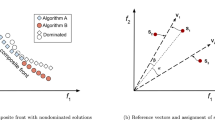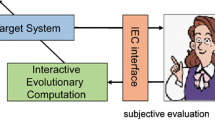Summary
Human fatigue is one of the most important problems of Interactive Evolutionary Algorithms (IEAs) that requires addressing. The problem of fatigue usually arises out of intensive interaction between the IEA system and the respondent. Consequently, due to lack of interest or attention, the respondent will provide biased answers either intentionally or unintentionally. To reduce the times of interaction in IEAs effectively, we adopt a learning approach to learn responedent’s preference model and then use this model to predict the fitness values of any given individuals. Unlike other research, we propose a novel system called ALP-IGA that integrates the theorem of incremental machine learning, the Algorithmic Probability (ALP), with Interactive Genetic Algorithm (IGA). Since the ALP model will utilize each interaction effectively to improve the accuracy of prediction, it is very likely our ALP-IGA system can predict respondent’s preferences precisely just after a few interactions. We have investigated the performance of our ALP-IGA via a Monte Carlo simulation. Experimental results indicated that the number of interactions needed by ALP-IGA is very small for some cases. In addition, we have also compared the prediction correctness of ALP-IGA with a contrast IEA system whose learning scheme is implemented by a neural network algorithm. The results showed that ALP-IGA is superior to IEA with neural network for all cases.
Access this chapter
Tax calculation will be finalised at checkout
Purchases are for personal use only
Preview
Unable to display preview. Download preview PDF.
Similar content being viewed by others
References
Bäck T, Fogel DB, Michalewicz Z (eds.) (2000) Evolutionary Computation 1-Basic Algorithms and Operators IOP Publishing
Takagi H (2001) Proceedings of the IEEE 89(9):1275–1296
Watson IPCCA, Bonham C (2000) Journal of Evolutionary Computation 8(2):197–222
Kim HS, Cho SB (2000) Engineering Application of Artificial Intelligence 13:635–644
Hsu FC, Huang P (2005) New Generation Computing 23(2)
Dozier GV (2001) in: Proceedings of the 2001 ACM Symposium on Applied Computing (SAC) 340–344
Solomonoff R (1964) Information and Control, Part I 7(1):1–22
Solomonoff R (1986) in: Kanal L, Lemmer J (eds.) Uncertainty in Artificial Intelligence Elsevier Science Publishers B.V. 473–491
Solomonoff R (2003) Progress in incremental machine learning Tr-idsia-16-03 revision 2.0 IDSIA
Gan J, Warwick K (1999) in: Proc. Int. Conference on Artificial Neural Nets and Genetic Algorithms
Kohli R, Krishnamurti R (1989) European Journal of Operational Research 40:186–195
Kohli R, Krishnamurti R (1987) Management Science 33:1523–1533
Biles JA, Anderson PG, Loggi LW (1996) in: International ICSC Symposium on Intelligent Industrial Automation and Soft Computing
Johanson B, Poli R (1998) in: Genetic Programming 1998: Proceedings of the Third Annual Conference Morgan Kaufmann 181–186
Tokui N, Iba H (2000) in: Proceedings of 3rd International Conference on Generative Art
Author information
Authors and Affiliations
Editor information
Editors and Affiliations
Rights and permissions
Copyright information
© 2005 Springer-Verlag Berlin Heidelberg
About this paper
Cite this paper
Wang, Lh., Wei, Py., Chang, Yt. (2005). Reducing Evaluation Fatigue in Interactive Evolutionary Algorithms by Using an Incremental Learning Approach. In: Abraham, A., Dote, Y., Furuhashi, T., Köppen, M., Ohuchi, A., Ohsawa, Y. (eds) Soft Computing as Transdisciplinary Science and Technology. Advances in Soft Computing, vol 29. Springer, Berlin, Heidelberg. https://doi.org/10.1007/3-540-32391-0_68
Download citation
DOI: https://doi.org/10.1007/3-540-32391-0_68
Publisher Name: Springer, Berlin, Heidelberg
Print ISBN: 978-3-540-25055-5
Online ISBN: 978-3-540-32391-4
eBook Packages: EngineeringEngineering (R0)




